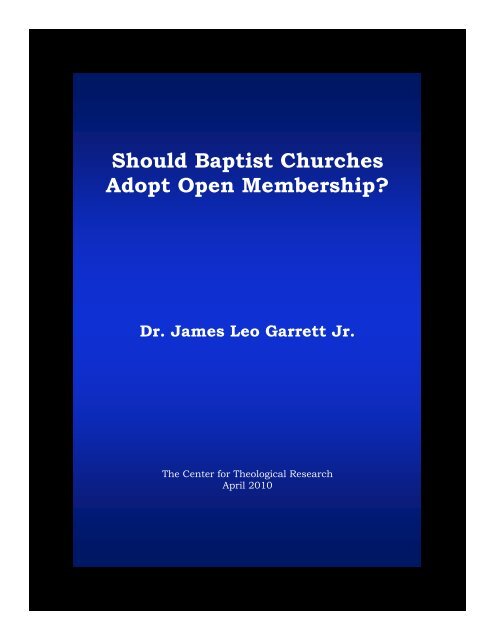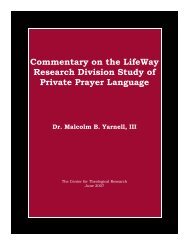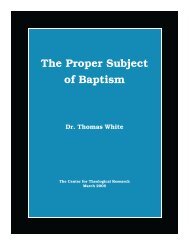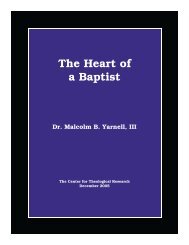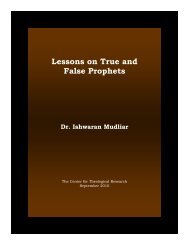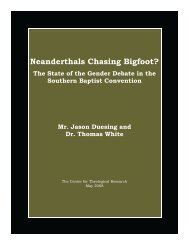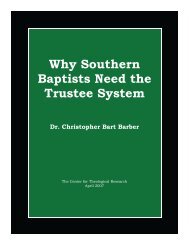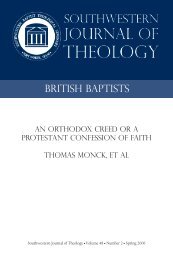Should Baptist Churches Adopt Open Membership? - Baptist Theology
Should Baptist Churches Adopt Open Membership? - Baptist Theology
Should Baptist Churches Adopt Open Membership? - Baptist Theology
Create successful ePaper yourself
Turn your PDF publications into a flip-book with our unique Google optimized e-Paper software.
<strong>Should</strong> <strong>Baptist</strong> <strong>Churches</strong> <strong>Adopt</strong> <strong>Open</strong> <strong>Membership</strong>?A White Paper from the CTR<strong>Should</strong> <strong>Baptist</strong> <strong>Churches</strong> <strong>Adopt</strong> <strong>Open</strong> <strong>Membership</strong>?<strong>Baptist</strong>s have not always agreed among themselves on doctrinal or ethical issues,but they have had some common beliefs that they have defended and on which they havebeen united. When one of these is challenged or rejected, the <strong>Baptist</strong> community is likelyto be in a crisis as to how to respond.Currently, a movement has been launched to convince <strong>Baptist</strong> churches to adoptopen membership. That means that <strong>Baptist</strong> churches should no longer insist that allpersons received into membership (barring some physical disability) have been baptizedupon and after profession of faith in Jesus Christ by the mode of immersion. Instead,persons who have had only infant baptism, who have had baptism by pouring orsprinkling, and possibly those who have had no baptism may be received into <strong>Baptist</strong>churches without immersion so long as they profess faith in Jesus. (This movementtoward open membership is to be clearly differentiated from open communion, eventhough open communion has sometimes led to open membership.)<strong>Should</strong> <strong>Baptist</strong> churches be encouraged to adopt open membership, or are theregood reasons for not doing so? I would like to offer five of the latter.First, believer’s baptism by immersion is probably the all-time central <strong>Baptist</strong>distinctive. Other answers have been given to that question. Soul competency can hardlybe traced behind E.Y. Mullins, a leading Southern <strong>Baptist</strong> theologian who made it theclue to <strong>Baptist</strong> identity in 1905. Congregational polity has from the beginning beenshared with Congregationalists. The priesthood of all believers has also been stronglyaffirmed by Lutherans. Religious liberty for all was originally a <strong>Baptist</strong> distinctive, buttoday it has been affirmed by most other Christian denominations. The Lordship of Christhas been claimed by others, if not applied as thoroughly.Although not a few non-<strong>Baptist</strong>s today practice believer’s baptism by immersion,the majority of professing Christians in the world today practice infant baptism. EarlyEnglish <strong>Baptist</strong>s were attacked for their baptismal beliefs and had to defend such; indeed,it was this belief that provided <strong>Baptist</strong>s their name. Texts such as Romans 6:1–4 and 1Peter 3:21 were employed in that defense. To make believer’s immersion optional in<strong>Baptist</strong> churches would be to denigrate the central reason for a <strong>Baptist</strong> witness and a<strong>Baptist</strong> denomination. According to William H. Brackney, a respected present-dayhistorian of the <strong>Baptist</strong>s, “believer’s baptism by immersion is essentially <strong>Baptist</strong>,” and itis “the major <strong>Baptist</strong> contribution to modern Christian ecclesiology [doctrine of thechurch].”It is, of course, true that John Smyth and Thomas Helwys, having recoveredbeliever’s baptism in 1609, did not practice immersion. The Particular <strong>Baptist</strong>s, whobelieved that the death of Christ was intended for and actually brings about the remissionof the sins of only those elected by God, a third of a century later adopted immersion.The General <strong>Baptist</strong>s, who believed that the death of Christ is adequate for the remission<strong>Baptist</strong><strong>Theology</strong>.orgPage 1 of 3
Dr. James Leo Garrett Jr.Distinguished Professor of <strong>Theology</strong>, EmeritusSouthwestern <strong>Baptist</strong> Theological Seminary


